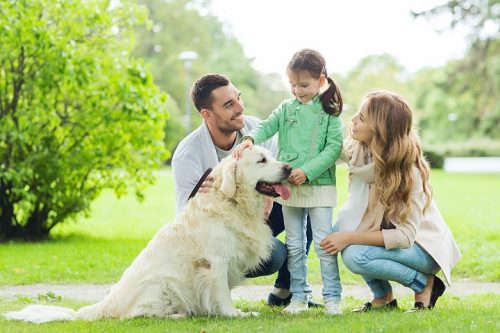
Babies and Pets: Tips for the Transition
Babies and pets are both a part of our families; however, a family expecting a baby is one of the main reasons pets are re-homed. This doesn’t have to be the case! To increase the chances of a smooth transition, a pet should start being trained the moment a pregnancy is confirmed.
Be patient with your pet when bringing home a new baby, as dogs don’t always understand babies or can be easily overwhelmed by them. Babies can be noisy, smell like food or dirty diapers, make weird noises, play with very loud toys, and grab at things, including your unsuspecting dog or cat. Then, as soon as baby starts to crawl, a pet may wonder why the baby is now on “their turf” and so on. This major life transition takes your pet some time to get used to – and lots of love from you!
Never leave a small child alone with an animal, especially as they are learning. If the child is afraid of the pet, don’t force an interaction. Doing so will cause fear in the child and stress in the pet and could lead to a bite instance. Pets are amazing at picking up subtle body language, but unfortunately, humans and pets don’t always speak the same language.
Do not allow your child to pull a dog’s tail, squeeze the cat, pinch them, pull their ears, lay on them, or pretend to ride them.
When a child becomes mobile, it’s time to start teaching the basics of respecting the family pet. Again, this is to be done with constant supervision by the parent or guardian on the child. To reiterate, NEVER, under any circumstances leave a small child alone with a pet. Even if they’ve gotten along in the past, both children and pets can be unpredictable and it’s not worth the risk to each of them.
Never allow a child to crawl up into a pet’s face, especially a sleeping or eating pet’s face. Even a well-trained pet may react out of surprise or fear when startled. Never allow a child to put their hand into the food a pet’s food bowl while they’re eating. (This is actually a good rule of thumb for all members of the family!)
Children need to be taught to respect the family pet. Do not allow your child to pull a dog’s tail, squeeze the cat, pinch them, pull their ears, lay on them, or pretend to ride them. Often, children simply become over excited and truly don’t realize their own strength. Think of the last time you were playing with a small child and they pretended to bop you or pinch you. It actually hurts – and can hurt your pet.
Children should not be allowed to “rough-house” or wrestle with the family pet as pets, especially dogs, will nip during play, but a nip from a large dog to a small child could end up being severe. Always pet an animal gently, from the back of the head down the length of its back. Children should not be permitted to pick up a cat or small dog without knowing the proper way to hold the animal without causing it pain. An animal in pain will react. Don’t make loud noises or sudden moves when approaching your pet.
Even at a young age, a child can be taught basic pet body language and what it means – showing teeth and hissing are warnings they want to be left alone and could lead to aggression if not respected. Teach them no stare into a dog’s eyes, as they could see this as a form on assertion.
As your young child ages, teach them more about the family pet and include them in the pet’s care, such as training, feeding and learning about your pet. It’s a great way to teach responsibility and respect for your furry family member. Pets and children can live together in harmony and even become life-long best friends, but rules and guidelines must be followed to prevent injury of the child and the pet. A love and respect of pets must be taught early and, if so, will provide a lifetime of love, companionship and friendship for your child.
Provided by Comfort At Home Pet Services, comforthomepetservices.com. As Pittsburgh’s first and ONLY Certified Professional Pet Services Company, we are not only passionate about superior pet care, we train for it!
